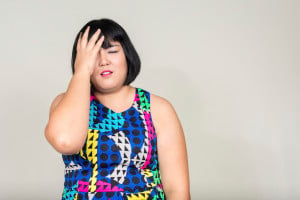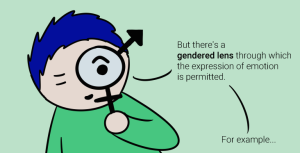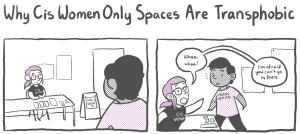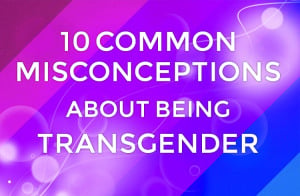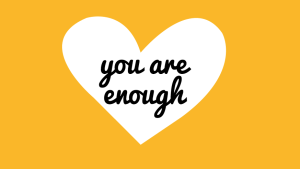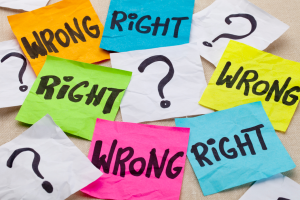
Person looking at their reflection in a window.
I grew up in a Filipinx American household that largely ignored mental health. The idea that I could experience mental unwellness didn’t even feel like an option because I never had a conversation with my parents about the possibility.
When my sister started struggling with her mental health, my dad urged us not talk about it to anyone outside the family. I always thought that he did this out of embarrassment, so when I started experiencing depression myself, I believed I had to be silent to preserve a sense of “integrity.”
I started having suicidal thoughts at 16 and I couldn’t bring myself to say that I needed help, even though I experienced symptoms that, at times, felt unbearable: feelings of hopelessness, fatigue, persistent sadness, and malaise.
It wasn’t until my first year of college that I finally spoke to a mental health counselor. Talk therapy prompted me to unpack what had previously kept me from seeking help and acknowledging that my symptoms were real.
More and more, I came to discover that my experiences are not isolated, but are in fact a part of a larger mental health crisis affecting Asian American women.
Asian American women from ages 15 to 24 experience the highest rates of depressive symptoms of any racial or gender group.
Even more alarmingly, young Asian American women show the second highest rate of suicide among any group, according to the Asian American Women’s Sexual Health Initiative Project.
The rate of suicide among Asian American women continues to grow in disconcerting ways, skyrocketing by almost one hundred percent from 2000 to 2009.
The American Psychological Association also says that U.S.-born Asian American women have higher rates of suicidal thoughts throughout their lifetime when compared to the general population.
Despite these sobering statistics, our community utilizes mental health care the least out of any racial group. Asian American women are even less likely than Asian American men to seek help too.
Asian American women aren’t utilizing services that could significantly benefit them, and we are suffering in silence because of it. Here’s why:
Cultural Stigma
Asian families across diverse ethnic backgrounds often perceive mental health as shameful or something that can easily be fixed when our parents tell us to “just be happy,” said JR Kuo, Program Coordinator for the National Asian American Pacific Islander Mental Health Association.
Because our cultural values emphasize family hierarchy and emotional self-control, acknowledging mental health issues and seeking treatment often becomes troublesome.
When we were teenagers, my sister proposed seeing a counselor, but my dad opposed it. The goal was to hide our struggles and — for my dad — seeking help felt like we were putting vulnerabilities out in the open.
Parents of second-generation Asian American women tend to be dismissive and disempowering of their daughters’ mental health struggles, said Dr. Hyeouk “Chris” Hahm, an associate professor at Boston University’s School of Social Work, in a Pulitzer Center article.
Before I started seeing a counselor myself, I felt like I had to be silent and “save face” because of a knee-jerk response to suppress what I had perceived to be shameful.
I resorted to self-harm because I believed it was my only recourse, which many Asian American women also turn to instead of seeking mental health care treatment.
Navigating the Intergenerational Gap
For second-generation Asian American women, navigating intersecting — and sometimes conflicting — identities further compounds our mental distress.
Asian American women often struggle with intersections of family conflict, oppression, career confusion and exploring racial identity, sexuality or religion, according to Dr. Agnes Kwong, a Seattle-based multicultural psychologist.
As a young Filipinx American woman coming into my own, I was developing a simultaneous awareness of politics, religion, my sexuality, and my own career path that countered my family’s often conservative views.
I felt like I disappointed them because I didn’t follow their traditional and often gender-prescriptive expectations of me. This made me feel awful.
“Since family cohesion and respect for elders are strong Asian values, the family discord can be particularly distressing and confusing,” said Dr. Kwong.
Feeling the pressure to meet unrealistic, gender-prescriptive expectations set by our families and society also contributes to experiencing low self-esteem.
Culturally Incompetent U.S. Mental Health Care
A study by Dr. Hahm has shown that Asian American women are not utilizing U.S. mental health care services because they don’t cater to our unique needs and experiences.
Dr. Hahm said that even if Asian American women do seek treatment, they often don’t stick with it because therapy traditionally made for white clients don’t work for them.
I went through a couple counselors before finding the right one for me, who happened to be an Asian American woman like me. My first counselors were white, and I found myself having to teach them Filipinx cultural values 101.
The cultural understanding with my Asian American counselor was already there. This allowed me to speak comfortably about the issues I was going through without judgment or confusion.
When practitioners don’t make an effort to be culturally-competent (regardless of race), they don’t quite understand the tricky intersections many Asian American women straddle.
As a result, many Asian American women choose not to go because they don’t think it will be effective. This has to change.
Here are some ways we can improve mental health care in the U.S. to truly cater to the unique needs of diverse Asian American women:
1. Recruit more Asian American mental health care providers
Recruiting more Asian and Asian American mental health care providers, especially women, can help destigmatize the use of treatment among Asian American women and cater to their unique needs, said Dr. Kwong.
Twenty-four-year-old Vietnamese American student Oanh Le, for example, has been inspired by her own mental health experiences as an Asian American woman to become a mental health counselor.
“I couldn’t find the right words to express myself or talk about abstract feelings and emotions with my parents,” Le said about navigating mental health growing up.
Ultimately, Le wants to destigmatize counseling and other mental health services by becoming a licensed practitioner that can help Asian Americans get the help they need.
2. Support relationship building between providers and communities
There is a disconnect between mental health providers, their clients, and their communities. We need to begin to bridge these gaps and promote relationship building.
According to Dr. Kwong, with communities of color, trust builds more quickly when providers — even those of a similar ethnic background — make the effort to reach out to them and literally meet them where they are.
We also need mental health practitioners to provide multilingual services, holistic education, and alternative services to promote community building and challenge what mental health care looks like beyond talk therapy.
This can be especially helpful in connecting with the parents of Asian American women, who tend to be wary of mental health care services in the first place.
3. Expand studies on experiences unique to Asian American women
The American Psychological Association says that ethnicity, race, and culture all impact mental health — from expressing symptom to seeking help and even building perceptions of mental health services.
There are nearly 50 different ethnic groups within Asian America, each with different cultural and immigration histories, so it’s crucial that mental health practitioners approach our needs with special tact so that no experiences get erased.
From ethnic background and socioeconomic status to sexuality and religion, we need comprehensive research that pays close attention to our intersectional identities.
***
Asian American women need to be heard, and we need our stories to be amplified.
Too often, we are resorting to unsafe coping mechanisms or suicidal behavior simply because we don’t have an outlet and course of action on how to unpack our struggles. This needs to change.
We must do everything in our power to ensure that Asian American women are no longer forced to suffer our mental health struggles in silence and shame.
[do_widget id=’text-101′]
Alicia Soller is a first generation-born Filipinx American digital storyteller committed to uplifting the narratives of communities of color. She is a graduate of the University of Florida, where she received her B.S. in Journalism and was first inspired to incorporate advocacy and activism into her work as a journalist. She currently does freelance writing, marketing, and design work with nonprofit organizations.
Search our 3000+ articles!
Read our articles about:
Our online racial justice training
Used by hundreds of universities, non-profits, and businesses.
Click to learn more
Most Read Articles
- « Previous
- 1
- …
- 30
- 31
- 32





